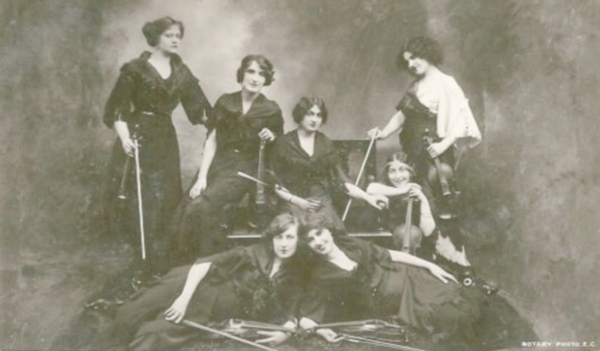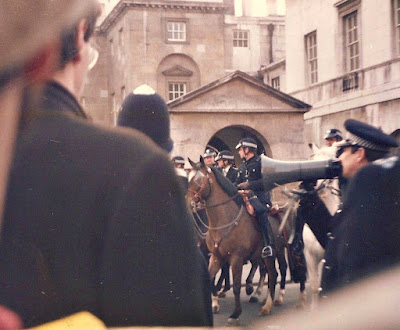Friday, September 16, 2022
London Anarchist Bookfair
Thursday, September 08, 2022
Monica Sjöö - art of anarcho-feminism, the Goddess and the peace movement
This was the night of Beltane and we were here to celebrate the Mother. We made a Beltane-fire carefully so as not to damage the mound and then gathered to discuss a possible ritual. By now, we had been joined by the American wise woman/witch, Starhawk' [who] 'suggested that we cast a circle, call in the elements, ground ourselves and dance the spiral dance. We danced and drummed and chanted'
At the end of the procession on 4th May they 'cut holes through the fences and snaked our way into the stones across the field, all the while singing Return to the Mother while police and tourists looked sheepishly on. Our number had by now increased since many women had come from London, Bristol and other nearby places to join us just for the weekend. Once within Stonehenge, we gave the ancient stone-beings loving care and energies and danced for hours amongst them; we meditated, sang, lit candles and dreamed.
Many pagans and people of the Craft have a love for the land and a reverence for the Earth, but many too do not realise that this is not enough and that one must also take political direct action against those that ill-treat and exploit Her. It was this understanding that fired the women on our walk'.
 |
| The exhibition at Beaconsfield gallery, 11 June to 10 September 2022 |
Wednesday, August 31, 2022
Ragged Ragtime Girls: Leila Waddell, Aleister Crowley and seven dancing violinists
I have been enjoying Phil Baker's 'City of the Beast: The London of Aleister Crowley' (Strange Attractor, 2022), which traces his life through places associated with him. In doing so he situates Crowley in a specific London bohemian world of cafes, salons, clubs and temples, populated by people often seen only as (mostly temporary) followers of his but who led interesting lives in their own right - and were probably much more pleasant/less abusive people to befriend.
One of the sites Baker mentions is the Tivoli Theatre which stood at 65-70 the Strand in London, a building 'demolished in 1914, replaced by the Tivoli cinema and the site is now a featureless modern office block'. It was here that in 1913 a musical troupe called The Ragged Ragtime Girls (sometimes spelt Ragged Rag-Time Girls) played for seven weeks, an act consisting of 'seven pretty girls who play the violin and dance at the same time'. I hadn't heard of them previously so set of searching at the British Newspaper Archive and elsewhere to find out more.
 |
| The Ragged Ragtime Girls |
 |
Monday, August 15, 2022
'Riot in Whitehall': London Miners Strike Demo 1985
 |
| Notice of demo in Socialist Worker |
 |
| Police in Hyde Park at start of demo |
 |
| Red and black flags on demo |
 |
| Crowd and police outside Whitehall Theatre of War (this was an exhibition of WW2 memorabilia) |
 |
| Here comes the police horses... |
 |
 |
| A demonstrator is comforted after police charge |
 |
| Demonstrator makes ironic nazi salute at police as horses move into crowd |
 |
'Sound of police truncheon against body': David Peace's miners strike soundscape
Miners demo in Mansfield 1984
The 'Here we go' chant
What did you do in the strike - my mix of music from the miners strike
Friday, August 12, 2022
Discothèque dancing - 'you don't need a band' (1964)
Thursday, August 04, 2022
Defend the Atlanta Forest
Saturday, July 30, 2022
Disco Chart 1980
Wednesday, July 20, 2022
Wildcat benefit at AMP, Covent Garden (1974) - with Charlie Gillett and members of Henry Cow
I am always interested in the social/cultural/musical life of radical scenes, here's a report of a London benefit night for the mid 1970s anarchist/libertarian left paper 'Wildcat' (no direct connection to 1980s ultra-left paper I believe). This report is from issue no.2 of the paper, October 1974. Sounds like an interesting line up including music from Lindsay Cooper and Fred Frith from Henry Cow with flautist Clive Bell, and DJing from Charlie Gillett and 'Pete's disco'. All this plus a performance from General Will, a radical theatre company that started out in Bradford and whose members included Brian Hibbard, later lead singer with the Flying Pickets.
The event took place at the Art Meeting Place, which I believe to have been at 48 Earlham Street, Covent Garden. It opened in 1974 and Cosey Fanni Tutti and Genesis P. Orridge were involved with it - indeed they first used the name Throbbing Gristle there. Cosey describes it in her book 'Art Sex Music' (2017):
'The shift in direction to COUM being mainly me and Gen also coincided with my leaving full-time work and connecting with other artists at the Art Meeting Place... AMP, as it was known, was set up by John Sharkey (along with others) in one of the buildings left vacant from the relocation of the Covent Garden fruit, veg and flower market. Other buildings had also been opportunistically acquired by activists for use as community centres and alternative arts spaces. AMP was a kind of Arts Lab that provided free facilities for artists across the spectrum - musicians, poets, film-makers - and was run by the artists themselves, with open meetings every week, exhibitions and performances. Me and Gen became regulars there, using their resources and trying out ideas in the available spaces- as did Anish Kapoor, Carolee Schneemann, John Latham, David Medalla, David Toop and Susan Hiller among others.
Participating in the meetings was always interesting, watching people getting antsy with each other over art or politics, or art being a political act, feminism and Marxism. Some people had great ideas and ideals to uphold but there were time-wasters whose posturing made me angry and I got the sense that they didn't fully appreciate what an amazing thing AMP was'.





































